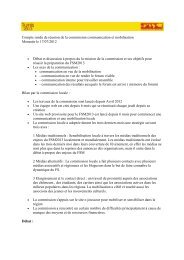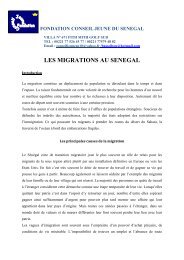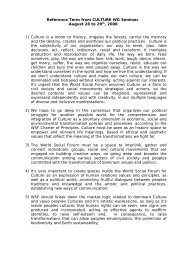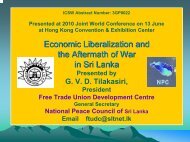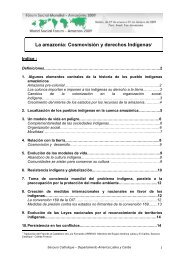You also want an ePaper? Increase the reach of your titles
YUMPU automatically turns print PDFs into web optimized ePapers that Google loves.
socialism is all about, that bring up the image of Eastern <strong>Europe</strong>.<br />
IPS: Is something like this actually happening anywhere in the world right now?<br />
<strong>Press</strong> <strong>Report</strong> <strong>Europe</strong> <strong>WSF</strong> <strong>2009</strong><br />
WB: I think what we are seeing are efforts along this line in a number of countries, certainly in Bolivia, Ecuador<br />
and Venezuela. I mean, of course each process has its own particularities, its own dynamics.<br />
I would say that as the crisis deepens - and I think we are at the beginning stages of this crisis - peoples’<br />
struggles are going to go beyond the very traditional mechanisms of stabilisation now under way. So I would<br />
imagine that we will see more and more of these efforts, for democratic control and participation as the crisis<br />
deepens.<br />
IPS: In this process, developing countries take the lead and the industrialised North stays behind?<br />
WB: I wouldn’t say that. I think people are still stunned by the crisis, especially in the United States, <strong>Europe</strong> and<br />
Japan. The crisis is moving very very quickly. I would not discount the emergence of popular movements in<br />
these areas of the world.<br />
IPS: There is also the risk of radical right-wing reactions such as those of France and Italy.<br />
WB: That is definitely a possibility. What we are going to see is three possibilities: a radicalisation to the left, a<br />
radicalisation to the right – this a great danger in the North, in places like Italy and France – or just paralysis.<br />
So there is no guarantee that progressive alternatives are going to grow. Progressives, with their knowledge of<br />
society and their strategy, must fight for hegemony.<br />
IPS: The German Left party seems to be an exception to the rule.<br />
WB: I think that Die Linke in Germany is a very very good example of trying to innovatively grasp the situation,<br />
moving from denouncing to pushing beyond social democratic responses to the current situation. Creating a<br />
situation to move towards people power, participatory democracy in both the economy and the state.<br />
IPS: You have recently written that the global balance of power is shifting to the South.<br />
WB: What I mean is that what we’ve seen over the last decade has been the weakening of the traditional<br />
centre economies. We saw that the U.S. went into this consumption, finance-driven form of capitalism, financed<br />
by China. Chinese credit has kept the U.S. economy going.<br />
In the last 10 to 15 years, countries like Brazil, China and India have become relatively stronger economic<br />
actors with the shift of jobs and capital; they have become the creditors of the North. That’s what I mean in<br />
terms of balance of power. I’m not saying they have become the new centre. Hegemonic power continues to be<br />
the North , especially the United States.<br />
IPS: Is this positive for the kind of struggle you call for?<br />
WB: It depends. Overall, the less hegemonic countries of the North become, and the more power is diffused to<br />
the global system, I think it is a positive development. On the other hand you must realise that these countries<br />
(of the South), these economies are controlled by, for all purposes, a capitalist elite, and in many ways, for<br />
instance in the case of China, it is less accountable than, say, the elite in the U.S.<br />
So on the one hand the positive thing is a diffusion of power, and on the other we are also talking about these<br />
new economy actors that are making a big difference, they are under the domination of a developmental elite. I<br />
think the challenge in the North is really for progressive movements to push their agenda, which is more<br />
participation and more democratic control of the means of production, of economic decision-making. The<br />
agenda is the same for movements both in the North and the South.<br />
IPS: In this context, how do you see the Israeli attack on Palestine?<br />
WB: I have held all along that there are certain key struggles that the <strong>WSF</strong> must take a very strong stand on.<br />
Definitely, the Palestinian issue is one of them. The <strong>WSF</strong> should take a very strong stand condemning Israel<br />
and supporting the right of Palestinians to their own state, and supporting the right of return of Palestinians to<br />
what is now Israel.<br />
I really feel the <strong>WSF</strong> can no longer say that we just want to provide a roof for discussions to take place. I have<br />
9




